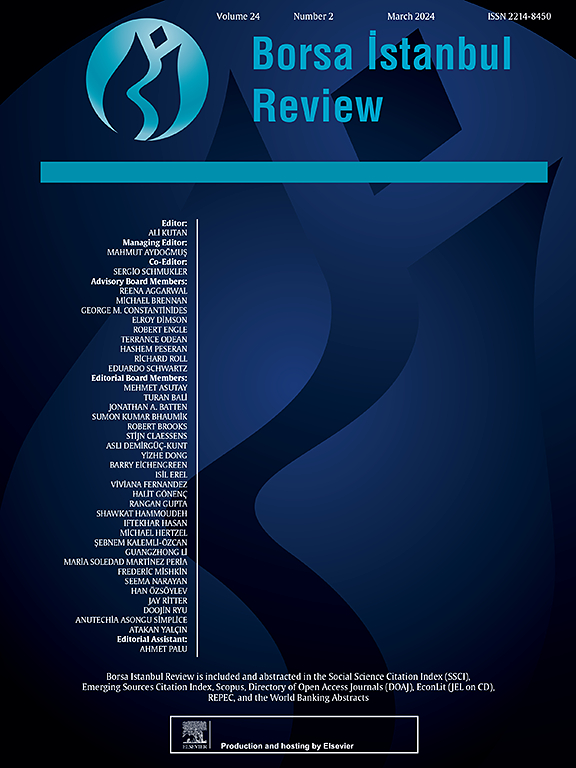环境、社会和治理评级的不确定性与机构投资--来自中国的证据
IF 7.1
2区 经济学
Q1 BUSINESS, FINANCE
引用次数: 0
摘要
本研究采用2015年至2022年中国A股上市企业的面板数据,运用年份、行业和地区的固定效应模型,实证检验了ESG评级和ESG评级不确定性对机构投资的影响。研究结果发现(1)ESG 评级对机构投资有显著的正向影响,但 ESG 评级不确定性的存在对机构投资有显著的负向影响。同时,ESG 评级的不确定性削弱了 ESG 评级对机构投资的影响。(2)机构投资者对政府相关企业(国有企业、政企关联企业)、行政权利扩张型企业、亏损企业、非重污染企业、非高科技企业、东部地区企业的ESG评级不确定性更为敏感。同时,被动型机构投资者对 ESG 评级的不确定性更为敏感。(3)机构投资者数量、政府补贴和证券市场表现是 ESG 评级不确定性影响机构投资的渠道。本文章由计算机程序翻译,如有差异,请以英文原文为准。
ESG rating uncertainty and institutional investment—evidence from China
Using panel data on China's A-share listed enterprises from 2015 to 2022, this study applies a fixed effects model of the year, industry, and region to empirically test the impact of ESG ratings and ESG rating uncertainty on institutional investment. The results of this study find that: (1) ESG ratings significantly and positively affect institutional investment, but the existence of ESG rating uncertainty significantly and negatively affects institutional investment. Meanwhile, ESG rating uncertainty weakens the influence of ESG ratings on institutional investment. (2) Institutional investors are more sensitive to the ESG rating uncertainty of enterprises that are government-related (state-owned and politic connected), executive-right-expanded, loss-making, non-heavy-polluting, non-high-tech, and in the eastern region. Meanwhile, passive institutional investors are more sensitive to the ESG rating uncertainty. (3) The number of institutional investors, government subsidies, and securities market performance are the channels through which ESG rating uncertainty affects institutional investment.
求助全文
通过发布文献求助,成功后即可免费获取论文全文。
去求助
来源期刊

Borsa Istanbul Review
Multiple-
CiteScore
7.60
自引率
3.80%
发文量
130
审稿时长
26 days
期刊介绍:
Peer Review under the responsibility of Borsa İstanbul Anonim Sirketi. Borsa İstanbul Review provides a scholarly platform for empirical financial studies including but not limited to financial markets and institutions, financial economics, investor behavior, financial centers and market structures, corporate finance, recent economic and financial trends. Micro and macro data applications and comparative studies are welcome. Country coverage includes advanced, emerging and developing economies. In particular, we would like to publish empirical papers with significant policy implications and encourage submissions in the following areas: Research Topics: • Investments and Portfolio Management • Behavioral Finance • Financial Markets and Institutions • Market Microstructure • Islamic Finance • Financial Risk Management • Valuation • Capital Markets Governance • Financial Regulations
 求助内容:
求助内容: 应助结果提醒方式:
应助结果提醒方式:


